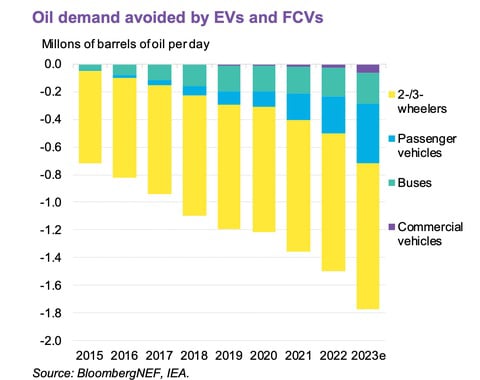- cross-posted to:
- worldinprogress@lemmy.world
- cross-posted to:
- worldinprogress@lemmy.world
1.8 Million Barrels of Oil a Day Avoided from Electric Vehicles::Sign up for daily news updates from CleanTechnica on email. Or follow us on Google News! We love covering electric … [continued]
I’d take diesel train infrastructure over electric cars any day
Or… Electric trains? Perhaps?
(And the good ones with overhead lines not the shitty battery ones)
Diesel can keep going when there is a power outage even if it is just enough to get people to safety.
I wonder if anybody is doing electric trains with onboard emergency diesel generators. They wouldn’t need to be able to move the train at full speed. They would just need to be able to get the train moving to the next station or whatever, in the event of a prolonged outage or damage to infrastructure.
thats not what I mean. Of course they would best but either option is better than EVs. Diesel trains are cheaper tho
Both would be good.
Not through cities. We need clean running options in densly populated areas
Thats not my point, my point is that dirty running trains are better than clean running cars.
deleted by creator
That’s a drop in the ocean compared to the total oil produced every single day.
Actually, in 2022 there were 94m barrels produced globally per day. So this is 2%. Statistically, not insignificant. Hopefully it’ll continue to grow rapidly.
Yeah… Really want to bring that down staggeringly?
STOP DRIVNG A GODDAMN CAR FOR SUB 5 MILE TRIPS AND START USING BIKES, PUBLIC TRANSPORTATION FOR LONGER TRIPS, AND YOUR LEGS FOR, YOU KNOW, TEO BLOCKS.
While at it, all the American continent should start redesigning their cities. Everything is designed for cars only, it’s all unsustainable.
While at it, all the American continent should start redesigning their cities. Everything is designed for cars only, it’s all unsustainable.
This, ban stroads, end climate change. Force companies to solve the housing issues and mandate de-gentrification. Bam, we all have a future, we can afford homes, WFH becomes truly optional and RTO policies don’t ruin livelihoods. It would be the next thing down from curing cancer, ending world hunger, and truly being the E in DEI for all.
>end climate change
*laughs in China*
Fuck.
Have an upvote.
Force companies to solve the housing issues and mandate de-gentrification.
These two things are opposites though?
Yeah well you cant expect consistent ideas.
The downvotes are from the conservative astroturfers that have been busy making Lemmy into more of a shithole like Reddit.
Also people who have places to go, things to carry or don’t live in places friendly to bikes. Maybe even people who think writing things in all caps is lazy. Not everything is caused by the conservative boogieman. Both nuance and effective communication are important.
The commenter said for short haul distances. Going to the store around the corner? You don’t need to bring the pickup truck (statistically, in North America, that’s probably the vehicle you drive).
Right, I don’t need a pickup truck, but I do need a trunk to put my groceries in to feed my entire family. I also need to do it quickly. They said 5 miles, that’s a long way.
is less oil dug up and burned?
Why did feel a need to poohpooh electric cars for such a weird reason?
if there is no difference in the actual oil extraction and burning, then it does no good.
A little less yeah, considering that there has been an increase in renewables for grid power, also it’s much more efficient burn oil/natgas/etc. in a big powerplant than in an ICE car, so less is needed overall.
So yes. It does help. But electric trains are still better lol And we need more renewable grid power
less is needed overall.
So yes. It does help
this is what i’m dubious about. just because less is burned in, say, passenger vehicles does not mean any less is produced or burned in some other industry. this article actually says that we made more oil this year than last.
But it does mean less was produced for and burned by the automotive industry
All other things equal if those EVs were ICE then even more oil would have been used for what should be obvious reasons
then even more oil would have been used
if the oil is in the ground, it can’t have been used.
Do you think we literally use oil as we dig it up with no buffer?
Or that oil extraction amount isn’t being constantly adjusted based on demand by every entity in charge of it?
Or that if more ICE vehicles were on the road more oil would be needed?
These are all very basic concepts
i think there is no way to prove we would have dug up and burned any more oil than we did since we can’t prove a counterfactual. what we do know is, despite an increased use of electric vehicles, oil extraction increased.
Removed by mod
unless it actually decreased GHG emissions, it did no good. it’s rearranging the deck chairs.
This is bullshit where is the proof also the electric batteries are mined by.kids in.the cpngo
I assume you’re talking about Colbalt mining? It was difficult to decipher your meaning.
Zero colbalt in a modern LFP battery which some cars are now using. Other battery chemistries do still use it, such as the device you used to type out your comment.
Colbalt is also used in the production of gasoline. And when it’s used, it’s used: more is required to refine more fuel. Whereas the colbalt in a battery remains useful again and again every time you recharge a battery.
So if you want to be mad about it, remember to be mad at your own usage as well.
deleted by creator
Let’s be straight about this: It ain’t electric cars. Its e-bikes
This article says there are 2 million electric cars on the road in the US.
At 20 gallons of gas per month x 12 months x 2 million, that’s…
480 million gallons of gas saved.
That’s just the US.
There’s also no motor oil in these vehicles.
31.5 gallons in a barrel so your math shows 15Mbbl saved
Article says 1.8Mbbl
I’m missing the discrepancy
The article says 1.8 per day
Weird. I wonder why it’s a non-standard barrel. 50 gallon drums are the ones that I’ve seen the most.
While 55 gal drums are the standard physical barrel, barrels as used for oil are their own unit, and oil is rarely in actual physical barrels anymore anyways. It’s weird, but it’s how the oil industry measures it.
My Bolt EUV uses automatic transmission fluid in the transfer case to reduce the RPMs of the motor to the wheels. Traditionally ATF is refined from crude, but you can use a synthetic replacement. As far as I know it doesn’t have any grease fittings either, so it’s all sealed in on bearings and the like. Don’t get me wrong though, it’s a massive reduction in petroleum usage though.
It’s helpful to remember too that the problem isn’t using petroleum, the problem is burning it.
As long as it’s properly disposed of using petroleum based lubricant doesn’t cause climate change.
Exactly, and petroleum really is a wonder material, it has so many amazing uses besides burning it but instead we decide to do the absolute worst thing with almost all of it
Who only uses 20 gallons a month?
Me probably, I don’t usually have to fill up my 15-gallon tank more than once a month. I don’t have to drive a lot and my car gets 30mpg when I do.
I am about that. Only use my car for work and picking up kids from aftercare. I would cycle to work but there is a highway that breaks my route.
Well, it’s both. From the article, 2-3 wheelers do account for 60% of the drop:

Oh this is so fucking typical. “EV” or electric vehicles never means e-bikes when it would benefit e-bikes (for example, EV subsidies = electric car subsidies) but when it conveniently makes electric cars look better, oh look an e-bike is an EV! 😒
Isn’t this article very clearly referring to Asian adoption of scooters, not a bunch of New Yorkers on e-bikes?
does that invalidate the point?
I mean, yes? You’re whining about US decision making around subsidies using a portion of the article discussing electric scooters in places like Taiwan. These are different continents and different vehicle types.
A $500 subsidy on electric bicycles would not get Americans out of their cars and onto a bicycle, but it might make cyclists move to electric bikes, which wouldn’t be a behavioral change that would impact anything relevant to this study.
I’m on your side, I wish my commute was only a couple miles. I’d ride a bicycle, and I’ve considered electric motorcycles. But you’re barking up the wrong tree, “price” is not what’s keeping Americans off of bicycles, electric or otherwise.
A $500 subsidy on electric bicycles would not get Americans out of their cars and onto a bicycle, but it might make cyclists move to electric bikes, which wouldn’t be a behavioral change that would impact anything relevant to this study.
why would you think that? I think you’re wrong and price is a big factor. cyclists are unlikely to move to ebike because they can already make it work on a regular bike.
Strange that the parent comment is downvoted for highlighting the fact that electric bikes (and scooters & trikes) continue to make more of an impact.
For me personally, since I got my electric bike 2 years ago, I use it at least 90% of the time to commute to work (unless the weather is too miserable).
If I may ask, what bike did you get, and what are the stats for range and speed?
Oh I’d have to check about the stats. I’m in Switzerland, where I use a Winora Tria 8 and usually carry along just above the electrical assistance (unless I go up a mountain), which caps out at 25 km/h.
This article says 1 million electric cars were sold in just 2023.
Still a vehicle in a pure sense.
I go to work 50/50 by electric car or analog bike. Most of those barrels saved it’s me
Yeah which is always weird. How many of those people weren’t just riding normal bikes before vs downsizing from a car. I’m on my 3rd EV and would love to bike if it were an option where I live, but if I went with a bike, I’d just be replacing another EV.
Assuming you could feasibly bike, it would probably still be environmentally better to use the bike, mostly because it is more energy efficient at moving a single human places because it doesn’t have to move a whole car frame, and in most places a fair amount of power is still from fossil fuels, so less would be needed. Also the other benefits of biking.
deleted by creator
I’d love one! By fuck me, I clicked a Lemmy link earlier and it was $7,000 USD. Did you want gears with that? Another $1,300.
All for a bike that won’t hit 40mph, which is hella dangerous on the open road. Couldn’t move out of danger fast enough. Had a 150cc scooter, never again, 250cc or bust.
But still, a gas scooter burns so little gas, I’d forget to look at the tank, had no idea what gas cost at the time.
You should be demanding dedicated and separated bike infrastructure
Chicken and egg problem for sure. I’ve been trying to convince my community/towns to try to build dedicated safe bike infrastructure for neighborhoods to schools at least. With the hope this can expand from there (plus more people just used to riding bikes!).
And secure bike parking!
That would be great! But I doubt anyone wants to put the $$$ into building a 30-mile bike lane on a rural highway out to my camp in the swamp. And that’s about the only place I go that really uses gasoline.
We don’t all live in cities, and some like me, find the idea appalling. (Been there, done that my whole life.) I’m quite happy on the very edge of town, where’s there are plenty of rivers, woods, creeks, trails and swamps to explore. But I just can’t safely bike to those places.
Obligatory “your 1% edge case doesn’t invalidate the point” comment.
Many many many many people could bike if there was infrastructure.
Again - it’s not a once size fits all solution. But you should still advocate for better bike infrastructure where applicable.
There’s a lot of FuckCars people who ask for too much. We don’t need to go completely car-less, and that’s an unattainable goal for a lot of reasons.
Most US cities have <5% of people using bikes as their main commute method, and around 20-30% doing work from home. What can we do to get to 20% of commuters on a bike while maintaining WFH numbers? That alone would be transformative. Tons of cars off the road, and enough bike usage to demand city councils dedicate more to bike infrastructure.
deleted by creator
That’s like claiming cars are too expensive because you can’t afford a Tesla.
I bought a wonderful ebike from REI for $1,300. You don’t need to buy the fancy luxury models.
$7k for an ebike? There are tons of good options for <$2000. Hell, you can get budget models on Amazon for around $300.
And most cities have bike lanes on city streets for a reason. However, if you need to commute to work that requires you traversing a highway, then yeah, ebikes are definitely not the solution for you.
When I lived in Eastern Europe, I bought a foldable E-bike for the equivalent of 500 USD from Decathlon.
My commute was 10km one-way. It was better than the bus. The thing still runs after 2 years of intense use and 2 years of complete neglect.
You want an ebike that hits 40mph?
I converted a bike I bought off Craigslist for $200 plus an $850 Bafang kit off AliExpress. Didn’t have any experience with bike maintenance beforehand, but did have access to a makerspace with a full bike bench (there’s some specialized tools for pulling things out). Didn’t have it completely working before winter hit–works as a bike, but the motor assist isn’t kicking in for some reason–but I still think it’s an option most people could pull off.
I just bought an E-bike with 40+ mile range for $275. 750W motor and 15Ah 48v battery bike with 7 gears, lights, an LCD, a cargo rack, and fat tires.
It was a good sale
That’s nuts, I thought 2k for USA made ebikes was crazy.
Know where I can best shop? I just want a low-end unit for cruising around my camp, running up to the store from there or my house, super simple stuff.
I was looking at https://electricbikecompany.com/?avad=334665_e359243b5 personally. I have a good distance from my house to town right now so I haven’t sprung on it yet, but the folding one looked interesting to me so I could pack in my car and use it around town when I go
but also factor in what it takes to charge those batteries because that is fossil fuel somewhere down the line.
You’re soooo behind the schedule. That was the anti-EV talking point 5 years ago. You were supposed to move to ‘but did they factor in the battery production??’ (which they do) and now use one of ‘but is the grid ready for so many EV?’ or ‘there are no EVs below $30.000’!!. You’re welcome.
No, even those are the old talking points! Now it’s “EVs have batteries that are very heavy, so they generate lots of tire particulates, which is way worse than the tailpipe emissions of ICE cars, which somehow magically don’t also have tires or something, and aren’t also getting heavier every year.”
Why wasn’t I told about the new talking points? I though we agreed all new talking points will be shared during Monday meetings. I will have a word with Kevin about this.
You skipped brakes. For a short time generating brake pad particulates was the talking point, until they discovered what “regen” meant
They did.
Naturally, less oil being burnt means less CO2 emissions. BNEF estimates that electric vehicles currently prevent 112 million metric tons of CO2 emissions per year. And this is net emissions reductions, also taking into account the emissions from extra electricity generation.
oh nice
edit: so the article claimed to have factored electricty generation. Cant believe you are the one being downvoted this hard. As someone who worked in the renewable energy research institute, each time people equal ev to ‘clean’ automatically I get crazy. The article especially mentioned china, who has a significant portion of electricty generated by coal. Even its by oil, it would produce more co2 for energy loss in conversion. The article has no merit with such flawed comparison
The article literally states they factored in charging the battery, which is the main reason they are being down voted. Read the dang article if you are going to criticize it.
I did not catch the single sentence buried there while being distracted by the old/new ev critism talk. Thanks for pointing out. This is interesting now if true. I’m reading the pdf later
Yeah I am assuming it is true based off other reasings. Didn’t really read the data behind this article though. From past references larger battery EVs take about 16 months of break-in before it’s carbon neutral for manufacturing / emissions costs from an ICE vehicle. At that point even the heavy fossil fuel reliant electrical grids for charging is more energy / carbon neutral than the cost to refine / deliver / use gasoline for ice vehicles.












